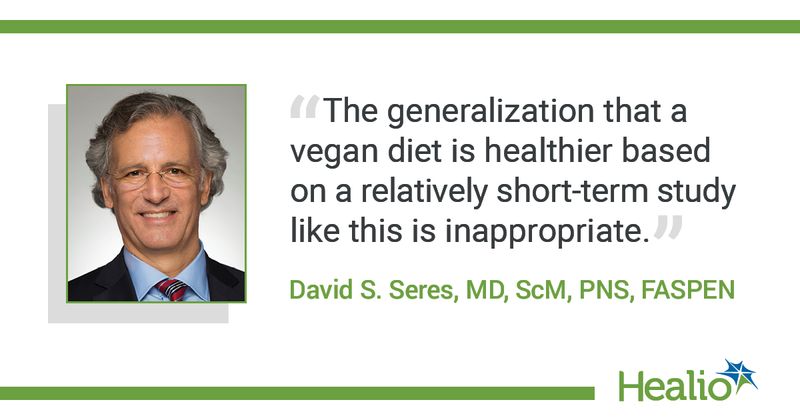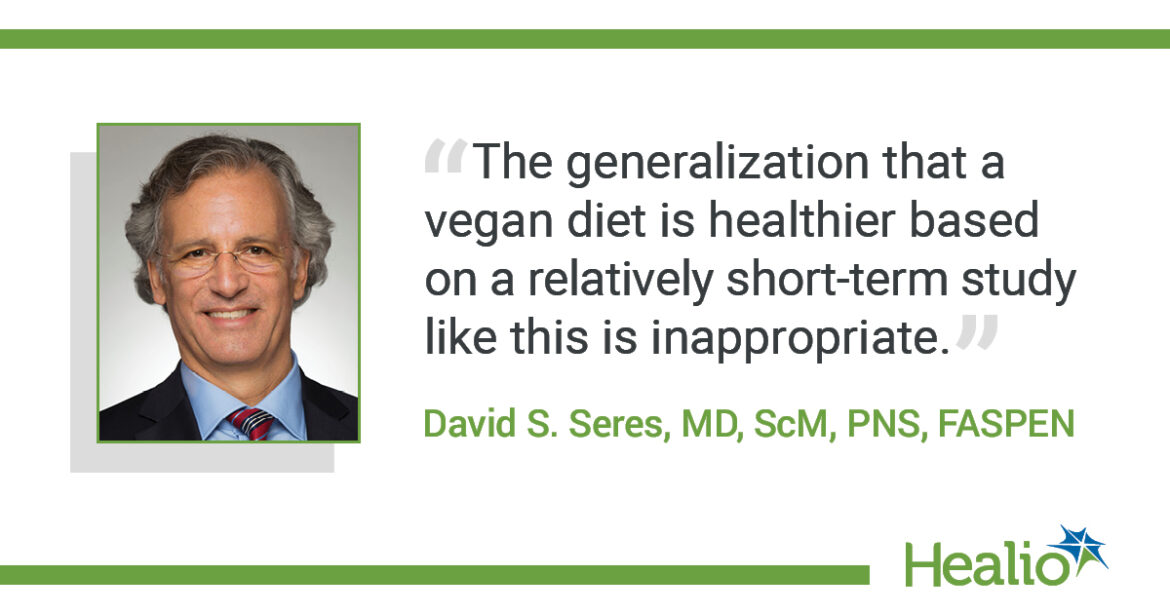February 16, 2021
5 min read
Add topic to email alerts
Receive an email when new articles are posted on
Please provide your email address to receive an email when new articles are posted on .
“
data-action=”subscribe”>
Subscribe
We were unable to process your request. Please try again later. If you continue to have this issue please contact customerservice@slackinc.com.
Back to Healio
U.S. News & World Report recently named Mediterranean the best overall diet. However, a study has found that a vegan diet improved lipid concentrations, body weight and insulin sensitivity better than the Mediterranean diet.
However, the study also showed that the Mediterranean diet was associated with greater reductions in BP, according to researchers.

“Previous studies have not yet compared the [Mediterranean and vegan] diets head-to-head,” Hana Kahleova, MD, PhD, director of clinical research at the Physicians Committee for Responsible Medicine, a nonprofit organization that promotes plant-based diet and research, told Healio Primary Care. “Our goal was to test the diets in one trial to see which diet is more effective.”

Hana Kahleova
In their randomized crossover trial, Kahleova and colleagues assigned 62 middle-aged adults with a BMI ranging from about 30 kg/m2 to 37 kg/m2 to follow a Mediterranean or vegan diet for 16 weeks. After participants had a variety of parameters measured, they returned to their baseline diets for 4 weeks, then followed the opposite diet for 16 weeks. The same parameters were measured again after a 10-hour fast coinciding with the end of the second 16-week period. Individuals with type 1 diabetes or substance use disorder and those who were pregnant or already on a vegan or Mediterranean diet were excluded.
Kahleova and colleagues wrote that “self-reported overall adherence to both diets was high.” Among the participants, 52 completed the study. The researchers found that the overall net weight changes after 16 weeks were 0 kg with the Mediterranean diet and –6 kg with the vegan diet (treatment effect [TE] = –6 kg; 95% CI, –7.5 to –4.5). The vegan diet was associated with a decrease in insulin resistance, measured by Homeostasis Model Assessment Insulin Reactivity (TE = –0.7; 95% CI, –1.8 to +0.4), and an increase in oral glucose insulin sensitivity (TE = +35.8 mL/min/m2; 95% CI, +13.2 to +58.3); however, the Mediterranean diet was not associated with significant changes in these parameters. Predicted insulin sensitivity did not change significantly in either group.
In addition, among all participants with no medication changes, the researchers reported that total cholesterol dropped 18.7 mg/dL and LDL-cholesterol decreased 15.3 mg/dL with the vegan diet, but there were no significant changes associated with the Mediterranean diet (TE = –15.6 mg/dL; 95% CI, –24.6 to –6.6). Systolic and diastolic BP decreased 9.3 mm/Hg and 7.3mm/Hg (TE = +5.9 mm Hg; 95% CI; +1 to +10.9] with the Mediterranean diet vs. 3.4 mmHg and 4.1 mm Hg with the vegan diet (TE = +1.8 mm/Hg; 95% CI, –4.6 to +8.1).
“We weren’t surprised to see that people saw improvements on the plant‐based diet,” Kahleova said. “Previous epidemiologic studies have shown that people eating plant‐based diets tend to have lower body weights and fewer cardiometabolic risk factors, compared with those following other dietary patterns.
“But because the Mediterranean diet is often touted for weight loss, it was surprising to see that participants in our trial didn’t lose any significant weight at all on this diet,” she continued. “However, previous clinical trials have shown significant weight loss on the Mediterranean diet included either added exercise or calorie restriction, confounding the effects of the dietary change. Our trial tested each diet without these additional factors, which likely played a role in the results.”

Neal Barnard
Neal D. Barnard, MD, FACC, president of the Physicians Committee for Responsible Medicine and study coauthor, said in a press release that the Mediterranean diet “crashed and burned when we put it to the test” of serving as a weight loss tool.
Editor’s note: Read a response to the perspectives below by Barnard.
Perspective
Back to Top
Though the study by Barnard and colleagues was properly done, their interpretation must be taken with a grain of salt. Pun intended.
Though their findings are hopeful that the patients in this short-term study lost more weight and improved their cholesterol and insulin levels, there are questions about whether the patients’ weight loss is sustainable. In addition, the authors did not control for the number of calories consumed. The changes in cholesterol that they report are consistent with the large amount of weight loss. But the generalization that a vegan diet is healthier based on a relatively short-term study like this is inappropriate.
It is also important to bring to readers’ attention that only three of the 12 authors have any academic affiliation, and that 10 of the 12 are members of the Physicians Committee for Responsible Medicine, which has long supported the vegan diet. A long-term commitment to an idea can increase the risk of introducing inadvertent bias into the design or interpretation of a study.
Another point I want to make is that healthy markers do not always translate to completely healthy individuals. For example, there are lots of people with low cholesterol who have had heart attacks for reasons other than their cholesterol level. Therefore, you cannot assume, solely based on a person’s cholesterol level, that this person will or will not have a heart attack. Further, their findings do not consistently favor the vegan diet. BP, a very important risk for CVD, decreased significantly more in the Mediterranean diet than in the vegan diet group. This is also not consistent with prior findings of an association between weight loss and a decrease in BP.
To find out whether the changes Barnard and colleagues described will result in better health, you would need a much longer study, because the health effects of any diet are slow to manifest. Longer and larger studies would be required to determine the size of the impact, how many people would have to be on the exclusively vegan diet to see the desired result, and for how long they would have to follow that diet, in order to be able to determine if the effort is worth it and whether people can even adhere to the diet without detriment. To date, nutritional effects on actual outcomes like the incidence of heart attacks tend to be small, even over a longer time period. I hazard to guess that adhering to a strictly vegan diet would have a relatively small effect with a very large effort.
Therefore, and unfortunately, there is not much physicians can take away from this study.
David S. Seres, MD, ScM, PNS, FASPEN
Nutrition section editor, UpToDate
Past Chair Medical Nutrition Council, American Society for Nutrition
Professor of medicine, Institute of Human Nutrition
Director of medical nutrition and associate clinical ethicist, Columbia University Irving Medical Center
Disclosures: Seres reports no relevant financial disclosures.
Perspective
Back to Top

Barnard and his colleagues are affiliates of the Physicians Committee for Responsible Medicine, a nonprofit group that promotes vegan diets and also funded the study. This potential bias needs to be considered when interpreting the study methodology and results.
Their major finding was greater weight loss with the low-fat vegan diet compared to a Mediterranean diet. This finding is not surprising, even in an ad-libitum intake study, as a low-fat vegan diet is a more restrictive diet compared to the Mediterranean style of eating. Short-term diet comparisons like this one usually favor the more restrictive diet plan, but when the diets are studied for a year or more, we tend to observe similar weight loss overall.
This leads us to the more important question, what is more feasible for a patient to follow long term? Both of these diets are beneficial for cardiometabolic outcomes. Both promote consumption of grains, vegetables, fruits and legumes. The low-fat vegan diet restricts all animal products and limits oils with a goal of 10% of energy from fats. A pillar of the Mediterranean diet is olive oil consumption as well as the use of herbs and spices to flavor foods. The PREDIMED dietary intervention, which was adopted by Barnard and colleagues for their Mediterranean diet recommendations, also promoted nut consumption as a way to tip the monounsaturated/saturated fatty acid ratio favorably. Moderate intake of fish, eggs, poultry and wine with limited intake of red and processed meats and sweets are also recommended. As we learn more about precision nutrition, we might be able to suggest one diet over another based on genetic interactions.
Regardless of our genetic makeup, we are all human and have personal preferences and habits that are difficult to change long-term. The best way to support a patient in behavior change is from a medical team approach. Talk to the patient, get to know their values and goals, what they like to eat, what are they willing to change, and work from there. Successful behavior change can happen, but support, knowledge and skills are required; and that occurs with more than just a diet prescription.
Heather Hutchins-Wiese, PhD, RD
Associate professor of dietetics and human nutrition programs, Eastern Michigan University
Disclosures: Hutchins-Wiese reports no relevant financial disclosures.
Add topic to email alerts
Receive an email when new articles are posted on
Please provide your email address to receive an email when new articles are posted on .
“
data-action=”subscribe”>
Subscribe
We were unable to process your request. Please try again later. If you continue to have this issue please contact customerservice@slackinc.com.
Back to Healio


Dining and Cooking